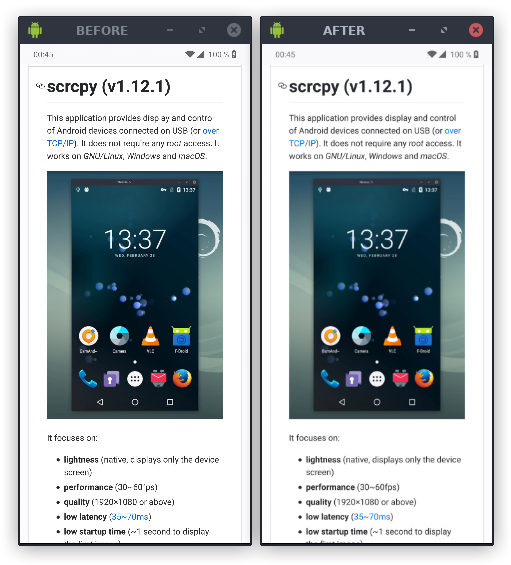scrcpy v1.13
To receive a notification on new releases, click on Watch > Releases only on the top.
scrcpy v1.13
Changes since v1.12.1:
- Add option to lock video orientation (#218, #1151)
- Add shortcuts to rotate the display (#218, #1274)
- Mirror secondary displays (#397, #898, #1177, #1238)
- Enable trilinear filtering when possible (#40, #1284)
- Add --render-driver parameter (#1284)
- Accept --max-fps before Android 10 (#488)
- Accept negative window position (#1242)
- Use another local port if 27183 is not available (#945, #951)
- Forward NumPad keys when NumLock is disabled (#1188)
- Fix issues when directory contains non-ASCII chars on Windows (#1002)
Do not print irrelevant workarounds errors (#994)- Fix possible BufferUnderflowException on touch event (#1245)
- Upgrade FFmpeg to 4.2.2 in Windows releases
- Upgrade SDL to 2.0.12 in Windows releases
Highlights
Rotation
The previous release (v1.12) added Ctrl+r to request the device to switch between portrait and landscape.
This release adds two additional rotation features, which do not change the device orientation:
- an option to lock the video orientation
- shortcuts to rotate display at any time
Lock video orientation
The parameter --lock-video-orientation changes the mirroring orientation:
scrcpy --lock-video-orientation 0 # natural orientation
scrcpy --lock-video-orientation 1 # 90° counterclockwise
scrcpy --lock-video-orientation 2 # 180°
scrcpy --lock-video-orientation 3 # 90° clockwiseThe locked orientation affects the recording, and never changes across the session.
Display rotation
New shortcuts are introduced to rotate the display at any time:
Ctrl+←(left) rotates the display 90° counterclockwiseCtrl+→(right) rotates the display 90° clockwise
This affects only the display, not the recording.
The initial value may also be provided on start via --rotation. Possible values are 0, 1, 2 and 3 (having the same meaning as that of --lock-video-orientation).
Multi-display
Some devices may expose secondary displays, like Samsung DeX (#397). To mirror them, a new flag --display has been added:
scrcpy --display 1
Limitations
The secondary display may only be controlled if the device runs at least Android 10 (otherwise it is mirrored in read-only).
Sometimes, mirroring the secondary display just shows a black screen (if some flag called FLAG_SUPPORTS_PROTECTED_BUFFERS is set for the display). There is no known solution for now (see discussions #898 and #1177).
Downscaling quality (trilinear filtering)
If the scrcpy window is far smaller (in pixels) than the Android device, visual quality can be very low (#40, #1284).
To improve the quality, trilinear filtering is enabled when possible (OpenGL 3.0+ or OpenGL ES 2.0+):
(see this comment for more details)
Mipmapping is automatically enabled if the rendering is done by OpenGL 3.0+ or OpenGL ES 2.0+.
On Windows, you may want to force OpenGL (instead of Direct3D) to benefit from this improvement:
scrcpy --render-driver=opengl
On macOS, it is not supported (there is no OpenGL 3.0).
To force-disable mipmaps even on supported versions of OpenGL, use --no-mipmaps.
